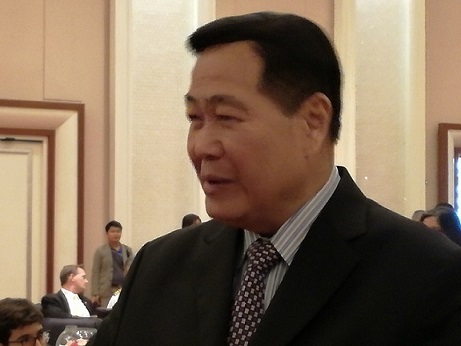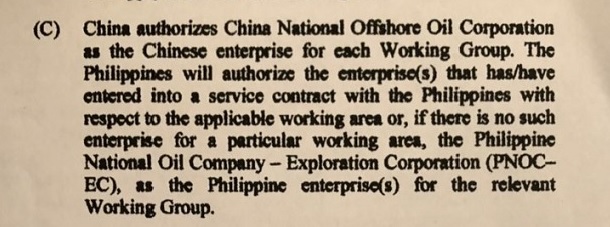
By Ellen T. Tordesillas, VERA Files
Acting Chief Justice Antonio T. Carpio said Friday China could be recognizing the sovereign rights of the Philippines in the disputed waters of the South China Sea covered in the recently-signed Philippines-China Memorandum of Agreement on Cooperation on Oil and Gas Development through service contracting arrangements as provided in the MOU.
Answering a question on the vagueness of the MOU signed by Foreign Secretary Teddy Locsin Jr. and Chinese Foreign Minister Wang Yi during the state visit of Chinese President Xi Jinping last week, he took note of this portion of the MOU: “China authorizes China National Oil Corporation (CNOOC) to be the Chinese enterprise for each Working Group. The Philippines will authorize the enterprise (s) that has/ have entered into a service contract with the Philippines with respect to the applicable working area or, if there is no such enterprise for a particular working area, the Philippine National Oil Company –Exploration Corporation (PNOC-EC) as the Philippine enterprise(s) for the relevant working group.”
“So there’s a recognition of service contracting by the Philippines. The way I interpret the MOU is that this is a cooperation by the Philippines with China on oil and gas activities through service contractors. So China comes in by being a contractor of our service contractor or taking equity position in our service contractor or both. So China will come in through service contractors. That’s my interpretation,” Carpio said during a during a forum on “Maritime Disputes in the South China Sea-Navigating the Diplomatic Waters,” organized by the Konrad Adenauer Stiftung and the Rizalino S. Navarro Policy Center for Competitiveness at the Diamond Residences in Makati.
“I don’t have any objection with that kind of arrangement because if China comes in through service contractors, those service contracts expressly recognize that the area falls within Philippine sovereignty or sovereign rights,” Carpio further said.

Sovereignty is the supreme power of a State to command and enforce obedience over a definite territory.
Sovereign rights as stated in the United Nations Convention on the Law of the Sea (UNCLOS) gives the coastal state exclusive right to explore and exploit the oil, gas and other mineral resources within its exclusive economic zone.
The acting chief justice, who served as adviser to the Philippine legal team during the hearing of the Philippine case against China at the Arbitral Court in The Hague, said if the cooperation would be in Reed Bank — also known as Recto Bank and Liyue Tan by the Chinese — 83 nautical miles off Palawan “ then we have sovereign rights there.”
Exploration in Reed Bank was started in 2010 when the Manuel V. Pangilinan-led Energy Forum won Service Contract 72. The work, however, was suspended due to harassment by Chinese ships of the Energy Forum ships.
Carpio said, “China can come in as sub-contractor or buy into equity of Forum energy or both. That’s okay because they are coming in through service contractors. “
Carpio said he looks at the dispute in the South China Sea with China, which claims almost 85 percent of the vast body of water, in three phases.
In the first phase, Carpio said, the Chinese asserted “indisputable sovereignty over the South China Sea.” In the second phase after the Arbitral Court ruled in favor of the Philippines in 2016, the Chinese expressed willingness to “meet halfway.”
With the MOU, Carpio said we could be entering the third phase where China says ”Okay, you have the sovereign rights but give us half of the income.”
“Service contactors are contractors authorized by the Philippines. They expressly recognize that the Philippines has sovereign rights. If China gets the job inside the service contractors, then we have entered the third phase,” Carpio elaborated on his reading of the MOU.
He is, however, cautious. “ Have we actually entered the third phase? Maybe.” He said he is not exactly sure whether that’s the way the Chinese understand it.
Aside from the Philippines, Vietnam, Malaysia, Brunei and Taiwan also claim parts of South China Sea.
Jay Batongbacal, director of the University of the Philippines Institute for Maritime Affairs and Law of the Sea, said the vagueness of the MOU serves a purpose. “The purpose is to delay a premature resolution, a premature decision on what clearly are still the most contentious obstacles to the joint exploration of the area. The document allows for the time to settle those issues first before going into exploration and development and that’s a good thing.”
Visiting member of the International Tribunal of the Law, Stanislaw Pawlak, who served as one of the judges in the Philippines vs China case in the Arbitral Tribunal, said “joint cooperation is a good thing provided that partners are equal.”
(VERA Files is put out by veteran journalists taking a deeper look at current issues. Vera is Latin for “true.”)
carpio doesn’t think like a chinese and he’s nautical miles off the mark, lol! at playing safe pa rin si carpio. too safe. nothing ventured, nothing gained, hoodwinked by rice paper.
Methinks Carpio wants to be next SC Chief Justice so, he’s keeping his peace for the moment.
once carpio, if ever, becomes the next chief justice, he has to forever keep his peace, or be served the same fate as sereno. becoming chief justice is no guarantee carpio will remain chief justice until his retirement in october 2019.
carpio is biting his own bullet na, hope it tastes good! lol!